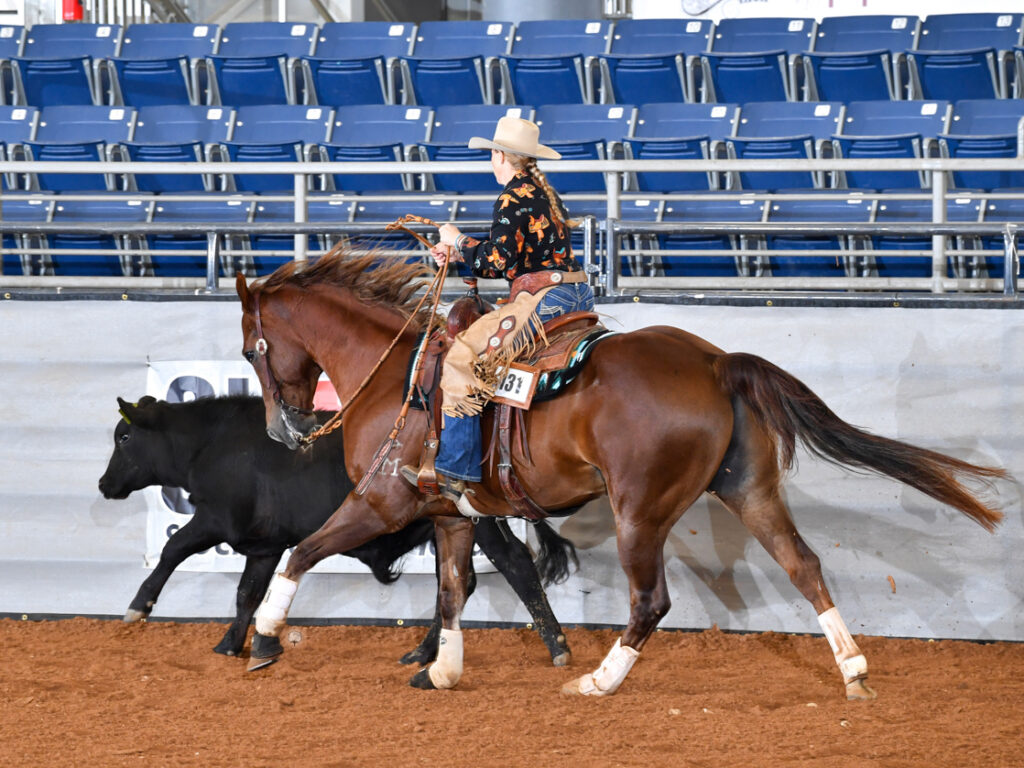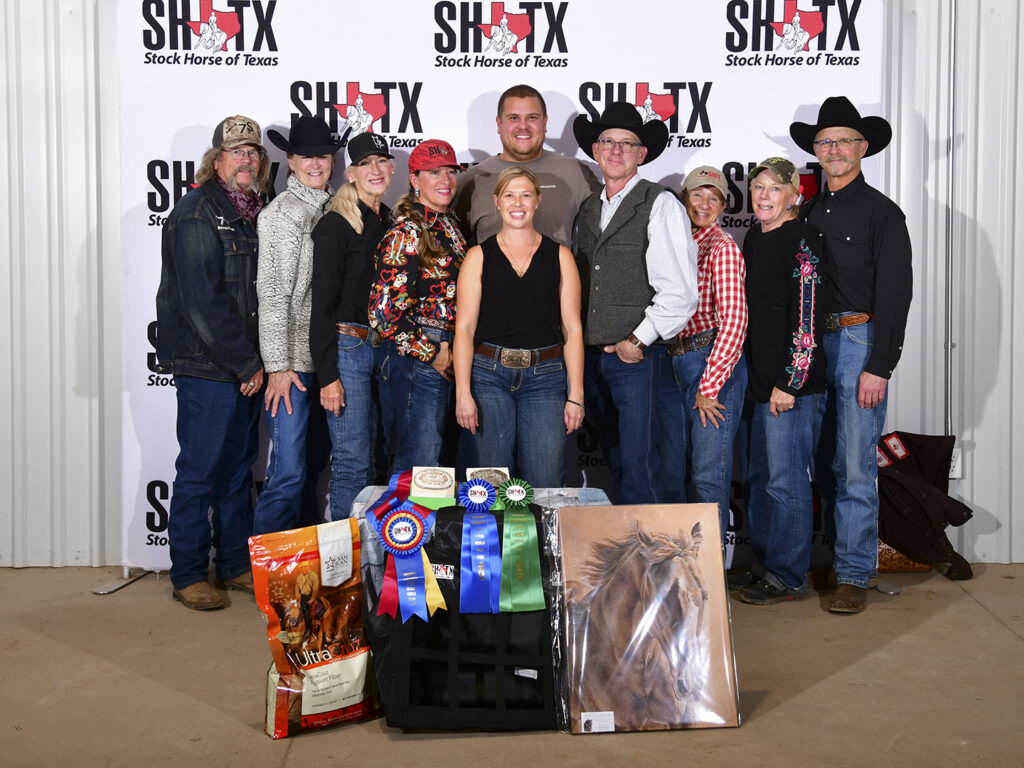Acing The Competition: VMBS Faculty Member, Heart Horse Take Home Championship
Story by Rachel Knight, VMBS Marketing & Communications

As a veterinarian and pet owner, Dr. Jen Fridley is well accustomed to the human-animal bond. However, when she first met her horse Ace, she had no idea how much their special bond would come to shape her life and career.
Together, Fridley and Ace highlight how the human-animal bond enriches life. Their friendship and mutual drive to succeed has helped them grow both as a team and as individuals and ultimately led them to become The Stock Horse of Texas World Show and Derby intermediate division champions and the overall year end Intermediate Stock Horse of Texas champions.
Being Dealt An Ace
Fridley and Ace have a special bond that horse owners often refer to as a “heart horse” relationship, in which a horse and their owner find their equine and human soulmate.
While in veterinary school at Mississippi State University, Fridley purchased Ace when he was just 6 months old. Neither of them knew it at the time, but Fridley would turn out to be the veterinarian “ace” the horse needed.
“When Ace was turning 2 years old, he was infected with botulism,” Fridley shared. “We had just moved to West Virginia, where I was beginning my career in private practice. We bought a house with some property for our three horses, and our new neighbor, who had cows, thought he was helping us out when he dropped a round bail into the back part of our property for the horses.”
Fridley explained that the wrapped round bale was fermented haylage, which is detrimental to horses and can cause botulism — a rare but serious, and often fatal, condition caused by a toxin that attacks the body’s nervous system.
“About 24 hours later, Ace started struggling to chew and swallow,” Fridley shared. “Then it progressed to him wanting to lay down all the time. I was probably three months into being a veterinarian, and my first thought was, ‘This is botulism.’”
The clinic Fridley worked at didn’t have the ability to hospitalize Ace, so she called around until she found a veterinary hospital that could provide both the anti-toxin treatment and the extended care he needed to fight the rare disease.

“Botulism is caused by a bacteria called Clostridium botulinum, which produces the toxin that makes botulism so detrimental to the body,” Fridley said. “The anti-toxin that treats botulism only stops the bacteria from creating new toxins, but we still have to wait 14 to 15 days for the toxins already in the body to pass. So giving the anti-toxin basically only stops the symptoms from getting worse.”
Fridley said the care for a botulism patient is intense, because during the 14 to 15 days that the toxin is passing through the patient, the patient needs round-the-clock care to perform the basic bodily functions that the toxin prohibits.
“During the waiting period, Ace couldn’t get up, he couldn’t swallow, he couldn’t eat or drink, and even had difficulties defecating and urinating on his own,” Fridley said.
For 16 days, Fridley worked at the clinic that employed her in the day and then drove an hour and half to Ace’s hospital, where she took the night shift to nurse him back to health.
“I learned a lot from the experience,” Fridley said. “I researched every little thing and contacted experts on botulism all over the country. Everyone told me the prognosis was grave, but Ace showed me he wanted to fight it, so that’s what we did.
“On the 15th day, he was still not standing and the hospital he was at didn’t have a lift, so my husband, who is an engineer, came up with a system that used straps and beams in the ceiling to lift him,” she shared. “After we lifted him and removed the straps, he stood for about 30 seconds before he collapsed back down. We continued to help him stand, and, eventually, he was stable enough to stand on his own, so we took him home, where I finished bringing him back to good health. So many people never thought he’d make it, but he did and I’m so thankful.”
Rediscovering A Passion

As she helped Ace recover, Fridley’s bond with the registered quarter horse grew. She trained him to ride after he was in good health, and the time they shared on the trail became cathartic for both of them.
Fridley’s career also continued to grow. She left the private mixed-animal practice after three years for a clinical faculty position at West Virginia University (WVU). Although she taught at WVU, she felt there was something missing, so when a clinical position supporting the VMBS’ Texas Department of Criminal Justice clinical rotation was posted, Fridley applied.
“I got the job and loved it,” Fridley said. “I enjoyed teaching students every day, especially in a clinical setting, and the students really loved it, too. They get great hands-on experience in that rotation and it’s fun to watch them grow and learn as they gain confidence in their skills.”
Shortly after moving to Texas, Fridley met Joni Watkins, a former employee at the Texas A&M Veterinary Medical Teaching Hospital and wife of Dr. Jeff Watkins, a professor of large animal surgery and the Linda & Dennis H. Clark ‘68 Endowed Chair in Equine Studies.
“We realized our mutual connection to the VMBS, and she said, ‘You should start showing in Stock Horse of Texas,’” Fridley recalled. “She started explaining it, and I got really excited. I showed horses throughout my life but had stopped in veterinary school to focus more on my studies. As she talked, I decided to start working with Ace.”
Growing Together
Fridley’s determination and the bond she and Ace share were tested in their early days of competition. The arena atmosphere was new and somewhat scary to Ace, which caused him to buck and rear and throw an occasional fit.
“Lots of people actually said, ‘You need to sell him,’ because they thought he was trying to be bad,” Fridley said. “He wasn’t doing it on purpose. He was just scared. Instead of trying to go to the shows, I started taking him to arenas that were new to us without the stress of the show. It took a long time, but now he is amazing at shows!”
In 2022, Fridley and Ace placed eighth overall, which achieved Frildey’s goal of being in the top 10.
“At our very first show in 2023, I told my husband that I just wanted to buckle, which requires you to place first or second in your division at that particular show,” Fridley said. “The first show of the year is one of the biggest, and we ended up winning. I somewhat jokingly told my husband, ‘All right, I won a buckle at the very first show. Now I’m going for the saddle.’”
The overall circuit champion wins a custom saddle, and Fridley and Ace were on track to win it.
“We did nine shows last year, with our final two shows being The World Show in Abilene, where you compete twice in the span of five days,” Fridley explained. “We placed first in the initial competition and fifth in the second competition, which combined to make us the World Show champions in the intermediate division as well as the Stock Horse of Texas intermediate division year end champions.”
A Well-Rounded Life

Fridley’s bond and competitive drive also has helped guide her in her career at the VMBS.
When the director position for the VMBS’ Veterinary Medical Park (VMP) became available, Fridley jumped at the opportunity to apply because it offered the opportunity to teach, practice surgery, and conduct research aimed at improving the lives of both animals and humans.
“It was a hard decision because I really loved the TDCJ rotation,” Fridley shared. “I ended up applying, though, because the VMP directorship offered a greater variety of duties, including some management and research opportunities that weren’t available as a clinical faculty on the TDCJ rotation.”
Fridley said that growing as a competitor and a veterinarian has been a rewarding experience and she’s thankful that Ace joined her in both her professional and personal journey.
“Ace and I have continued to get better, and I think that’s what it’s all about,” Fridley said. “Being a veterinarian is about learning so that we can better help our patients. Conducting research is about making discoveries so that we can find new ways to treat people and animals. Horse shows with Ace help me grow while also keeping me grounded. They force me to focus on improving one thing at a time, and that’s really the key to growing both personally and professionally.”
###
For more information about the Texas A&M College of Veterinary Medicine & Biomedical Sciences, please visit our website at vetmed.tamu.edu or join us on Facebook, Instagram, and Twitter.
Contact Information: Jennifer Gauntt, Director of VMBS Communications, Texas A&M College of Veterinary Medicine & Biomedical Sciences, jgauntt@cvm.tamu.edu, 979-862-4216


